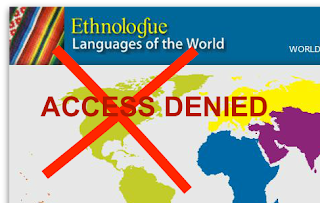Ethnologue more restricted

In April this year, Ethnologue changed access restrictions to their website again. Now, non-paying users from high income countries can only access 1 page per month before they are banned, previously it was 7. In light of this change, we will go through some basics regarding the paywall again (old post here) and where you can go instead. Finally, I list some questions should any SIL International/Ethnologue staff see this post. Basics on the pay-wall We haven't received much detailed information on this change, but if it's the same as last time it means that users with IP-addresses in countries that are classified by the world bank as "high-income" will be restricted. Cloudflare would appear to be the service provider managing this for Ethnologue. Previously, we've learned that only 5% of users look at more than 7 pages per month. We don't know how many go to more than 1 page (probably a lot more though!). SIL International also maintains the IS...

